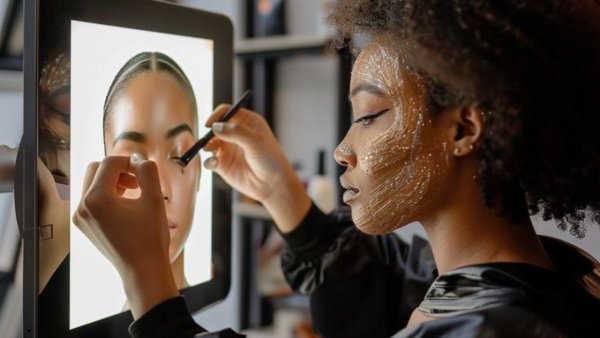
The beauty industry has always been driven by innovation and today, artificial intelligence (AI) is at the forefront of transforming how consumers approach skincare. The rise of AI-powered beauty tools, including sophisticated skin analyzers, has revolutionised how we understand and treat various skin concerns, offering a level of personalization that was previously unattainable.
Among the most impactful advancements is the AI-powered skin analyzer, which provides users with an in-depth look into their skin's condition. By examining factors such as hydration, elasticity, pigmentation, and pore size, AI delivers personalised skincare recommendations that go far beyond the scope of traditional methods.
 AI: A Game Changer in the Beauty Industry
AI: A Game Changer in the Beauty Industry
AI's introduction to beauty is transformative. By analysing vast data sets, these systems provide tailored skincare recommendations, helping users achieve more effective results and ultimately boosting customer satisfaction. One of the most beneficial aspects of AI in skincare is the accessibility it provides. AI-powered skincare apps allow users to receive a comprehensive skin diagnosis from the comfort of their homes. These tools can detect issues such as dryness, blemishes, or uneven tone, and provide personalised product recommendations to tackle these concerns. This hands-on approach to skincare is empowering consumers to take control of their beauty routines, knowing they are receiving expert-level advice.
Similar technologies are also emerging in hair care. AI-driven tools analyse user-inputted data about hair type and concerns to offer tailored product recommendations and routines. This evolution towards highly specific, personalised care extends across the entire beauty spectrum.
 How AI Skin Diagnostics Work
How AI Skin Diagnostics Work
AI skin analyzers work by using machine learning algorithms that evaluate data from high-quality skin images. These images, taken via smartphone cameras or specialised devices, are processed to assess various skin characteristics such as texture, tone, wrinkles, and more. AI then compares this information against an extensive database of skin profiles from diverse users, ensuring that the analysis is accurate for each individual.
For example, an AI skin analyzer might detect a user's hydration level and recommend products tailored to oily, dry, or combination skin. As these systems continue to learn from user data, their diagnostic accuracy improves over time, offering increasingly personalised and precise recommendations.
The Role of AI in Product Recommendations
The role of AI in skincare goes beyond just diagnostics—it plays a crucial part in suggesting the right products. Here’s why these tools are invaluable in product selection:
1. Custom Solutions Based on Detailed Data
Traditional skincare is often a process of trial and error, with consumers guessing which products will work for their skin type. AI skin analyzers take the guesswork out of the equation by analysing users’ skin profiles and suggesting products that directly address specific concerns such as hyperpigmentation, dryness, or ageing.
2. Proactive Issue Detection
AI tools are capable of identifying potential skin issues long before they become visible. Early detection of concerns like fine lines, blemishes, or sun damage allows users to address these problems with targeted treatments, leading to better long-term skin health.
3. Boosting Product Efficacy
AI-powered recommendations ensure that skincare routines are optimised for maximum effectiveness. For instance, an AI tool may suggest combining a hydrating serum with a complementary moisturiser to lock in moisture, creating a synergy that enhances overall results.
How often you should oil your hair in winter
4. Tracking and Adjusting Skincare Routines
Skin conditions can fluctuate due to factors such as seasonal changes, stress, or diet. AI-driven systems can track these changes and adjust skincare routines accordingly, ensuring users stay on top of their skin’s evolving needs.
The Future of AI in Skincare
AI technology in skincare is only scratching the surface of its potential. As it evolves, AI will likely incorporate genetic data, environmental factors, and even lifestyle choices into its analyses, offering predictive insights that help users maintain healthier skin for the long term. The future promises even more advanced diagnostic tools that can identify skin concerns before they develop, giving users the power to take preventive measures early on.
With AI, the beauty industry is becoming increasingly customised, providing consumers with hyper-personalised skincare experiences. This shift towards data-driven beauty ensures that every individual can achieve their skin goals with products tailored to their unique needs. AI in beauty is a revolutionary step towards more personalised, precise, and effective skincare.
Why should you clean your makeup brushes often?
By analysing individual skin data, AI helps consumers navigate the overwhelming world of skin care products with ease and confidence. As this technology advances, both users and brands will benefit from more efficient and targeted skincare solutions, ultimately leading to better skin health and satisfaction.
Inputs by: Taniya Pandey, VP of Marketing, Beauty and Wellness at VLCC
 The beauty industry has always been driven by innovation and today, artificial intelligence (AI) is at the forefront of transforming how consumers approach skincare. The rise of AI-powered beauty tools, including sophisticated skin analyzers, has revolutionised how we understand and treat various skin concerns, offering a level of personalization that was previously unattainable.
The beauty industry has always been driven by innovation and today, artificial intelligence (AI) is at the forefront of transforming how consumers approach skincare. The rise of AI-powered beauty tools, including sophisticated skin analyzers, has revolutionised how we understand and treat various skin concerns, offering a level of personalization that was previously unattainable.

